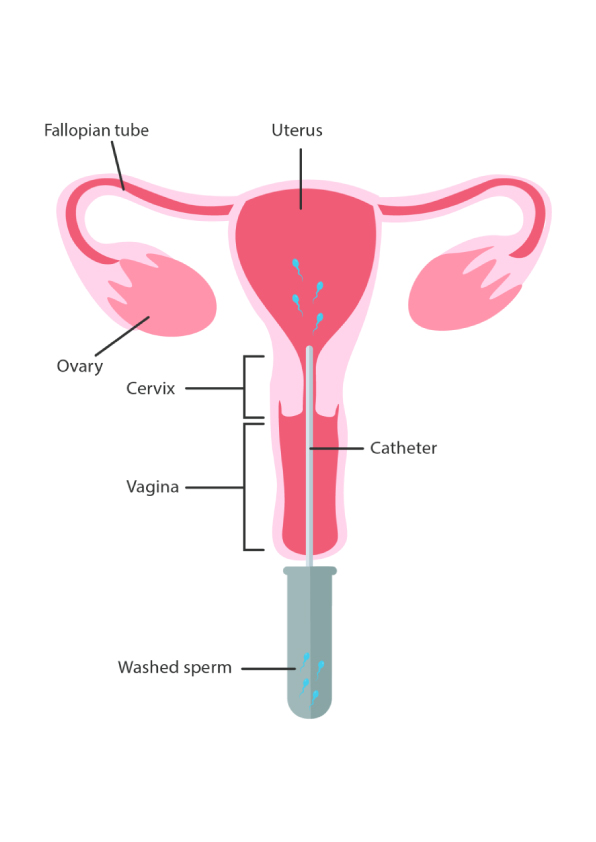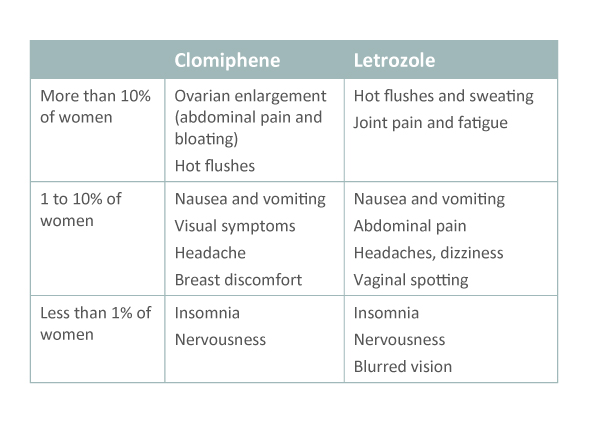
Intra-uterine Insemination (IUI)
Intra-uterine insemination (IUI) is a treatment where sperm is prepared in a lab, then placed into the uterus at the time that eggs are released from the ovaries. This way, sperm doesn't have to fight its way to the uterus as it would do naturally.
IUI is only suitable for women with patent (open) fallopian tubes and men with high sperm quality (or minor abnormalities). Many couples with unexplained infertility opt for IUI as a simpler option compared to IVF.
It is often paired with ovulation-induction treatment, such as stimulation using clomiphene, to improve success rates.
Intrauterine Insemination (IUI) with ovarian stimulation is a treatment often used for couples with unexplained infertility.
Preparation
For an IUI cycle, we will use blood tests throughout your menstrual cycle to work out when ovulation Ovulation is when an egg is released from the ovary. Usually, we give you medication (Clomiphene or Letrozole) to induce ovulation and/or promote development of 2 to 3 follicles. We might need to give you an ultrasound scan of your ovaries to see how many follicles are growing.
Insemination
At the time of ovulation, your partner will give a sperm sample. This sample will be prepared in the lab before the insemination procedure. The motile sperm are put through the cervix into the uterus using a thin plastic catheter (see picture 1). We will take a blood test two weeks later to find out whether you are pregnant.
Success rate
The chance of pregnancy per cycle of IUI is approximately 15%, your age is the determining factor. A recent study conducted in New Zealand showed that three IUI cycles with ovulation induction is better than expectant management (trying at home) in couples with unexplained infertility. There was a 30% chance of a live birth compared to 8% without treatment.
IUI is available both publicly and privately. Your consultant at Fertility Plus will check your eligibility for publicly funded treatment.

Clomiphene and Letrozole
Clomiphene and Letrozole are common drugs used in fertility treatment. These drugs promote follicle development and induce ovulation. Both are taken as tablets, once a day for five days from Day 2 of your menstrual cycle.
With any fertility drug, there is a risk of a multiple pregnancy occurring:
- With Clomiphene , the risk of twins is about 8% and the risk of triplets is about 0.3%.
- With Letrozole, the risk of twins is less than 5% and the risk of triplets very low.
- In natural conceptions, multiple births occur about 1.2% of the time.
To reduce this risk, it is especially important to have the monitoring blood tests during your cycle.
Side Effects
Side effects quickly improve soon after stopping therapy. It is important to let us know if you have any symptoms you are worried about.

There is no evidence that Clomiphene or Letrozole increases the risk of spontaneous miscarriage or causes any congenital abnormalities in children born as a result of this treatment.
Starting treatment
- If you have decided that you would like to move ahead with IUI treatment, please call so that we can arrange for you to sign consents and complete any outstanding tests that may be required. Please note, we can’t book you on for treatment without them e.g. cervical screening and swabs for infection, some of these can take over a week
- Phone or email the nurses on Day 1 of your period i.e. the first day of a full menstrual bleed. If you email, include subject heading ‘Day 1’ and your NHI number. You may need to leave a message and your call will be returned as soon as a nurse is able to.
You will be told when to have your first blood test. You will need to have more than one blood test for us to follow your cycle and work out when ovulation is about to start. Blood tests are carried out at a Lab Test facility. Check the back of blood test form for your nearest lab. These tests need to be done before 9.00am. - If you have been advised to take Clomiphene or Letrozole, start the tablets on Day 2 and take every day for 5 days. You will be told how many tablets to take each day.
- On the afternoon of your first blood test you will be phoned with further instructions.
- Depending on blood test results, you may need an ultrasound scan to give us a better idea of where you are in your cycle. We will do this at Fertility Plus. The scan is carried out vaginally so we won’t need you to have a full bladder.
- When blood tests show us that you are about to ovulate (i.e. there is a luteinising hormone (LH) surge in your blood), you will be given a time to come into the clinic to have the insemination.
- Your partner’s sperm sample is required in the Fertility Plus lab about 2 hours before insemination. This sample must be delivered by the man himself and he must bring photo identification (e.g. a driver’s license or passport). Do not have sex or masturbate for 2 to 3 days before providing the semen sample. It is better to have no longer than 3 days abstinence.
If you wish to produce the sample at home, you must let the lab know on (09) 630 9842
Insemination
- The semen sample is analysed and put through a washing process in order to harvest the good quality, fast moving sperm to be used for insemination.
- For insemination, a speculum is placed in the vagina. The sperm is passed through the cervix into the uterus using a fine catheter. This is usually performed by a nurse. You may experience some discomfort but it should not be painful.
- We take a blood test seven days after the insemination to check your progesterone level. This test is to confirm that you ovulated.
- A pregnancy test is performed around two weeks later.
Note: The nursing phone lines are often busy; please leave a detailed message and someone will get back to you as soon as possible. If you leave a message after 4pm your call will not be returned until the following morning. If you have had a blood test and are waiting for further instructions, you will receive a call the same afternoon.
Private paying patients
When you phone to book your IUI treatment, the nurses start the administrative process for your cycle. If you decide to cancel your treatment before insemination then you will need to pay a booking fee. If your treatment is stopped/cancelled during the tracking phase then you will be charged for the blood tests and any ultrasound scans.
If you have any queries or concerns please contact the nurses
Call (09) 630 9810 Ext: 3
Email fertilitynurse@adhb.govt.nz